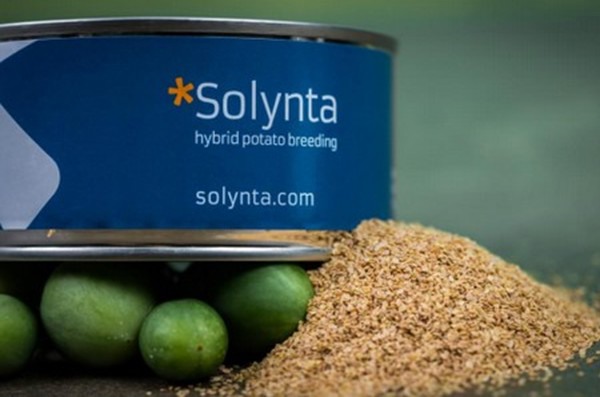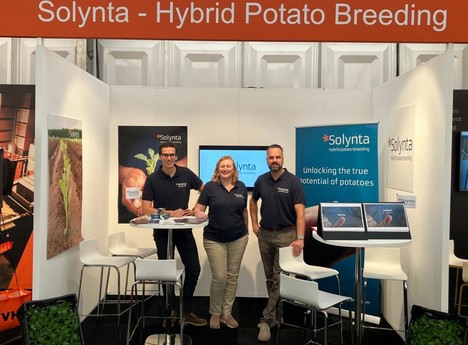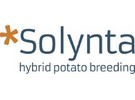After 15 years of developments and cultivation trials, Dutch potato breeder Solynta will introduce its first commercial varieties to the market in 2024. The innovative 'F1 hybrid breeding technology' means you can grow new, high-quality, and, above all, highly resistant potato varieties faster.
And, per the much-discussed Green Deal, these require far fewer crop protection products during cultivation. After the potato sector's initial skepticism, the pioneering product received nothing but praise at the recent Potato Europe in Tournai in Belgium. Business developer Jos Aben confirms this.
This potato year is another for the books due to the extreme weather, with weeks and weeks of no rain and then excessive rainfall. "A good example of the reality we live in and the challenges growers now face," Jos begins. That demands robust varieties or, at least, hardy potatoes. That applies to all segments (consumer, industry, and starch potatoes). Variety specifications per growing region must, of course, be considered, too.
 Hybrid varieties are propagated via botanical seeds. That greatly simplifies logistics. Usually, you need 2,500 kg of seed potatoes per hectare of cultivation. However, hybrid varieties need only 25 grams of seed.
Hybrid varieties are propagated via botanical seeds. That greatly simplifies logistics. Usually, you need 2,500 kg of seed potatoes per hectare of cultivation. However, hybrid varieties need only 25 grams of seed.
Jos, who switched from strawberry to potato breeding two years ago, knows that the amount of resistance is the ultimate decisive factor. After all, growers must deal with the so-called Green Deal, which allows far fewer crop protection products to be used by 2030. Yet, the transition is faltering. "The new regulations mean it will soon be impossible to spray plots 10-12 times against Phytophthora."
"Our 100% hybrid breeding technology responds by giving growers disease-free seeds to cultivate clean, sustainable crops. The technology also lets you breed customized varieties within a shorter time, fully meeting both growers' and traders' expectations. That also ensures that using so-called dual-purpose varieties for various purposes (e.g., consumer segment and french fries) will no longer or hardly ever occur," Jos says.

Solynta's team at Potato Europe 2023. F.l.t.r: Xarain van Os, Caroline Elias-Mackay, and Jos Aben.
Potato seeds in a can
Solynta already has a few varieties with multiple resistances to Phytophthora. These will be offered commercially next year. "We focus on all segments, with ware potatoes still the largest market. In that segment, good flavor is particularly decisive, as many smaller European growers still do direct marketing."
Commercializing these first breeding varieties obviously involves targeted marketing. That is why Solynta recently, for the first time, exhibited at Potato Europe, Europe's largest potato trade fair. The company can reflect on a successful debut, reports Aben. "We had many good conversations with interested parties from outside Europe, for example, North Africa, the Middle East, and India, too. We'd brought several product samples," he says.
"You do see the occasional frown when you bring along potato seed in a can. People are used to the familiar seed potatoes. In that sense, we're the odd man out. Yet, the facts speak for themselves: our technology eliminates the many multiplications of seed potatoes and, with that, a considerable cost item. But the primary argument is that our potato seed enables disease-free and sustainable cultivation. I believe the market's ready, and that the potato sector's on the cusp of a major transition," Jos concludes.
Photos: Solynta
For more information:
Jos Aben
Solynta
2 Dreijenlaan
6703 HA, Wageningen, NL
Tel: +31 (0) 638 993 371
Email: jos.aben@solynta.com
Website: www.solynta.com
